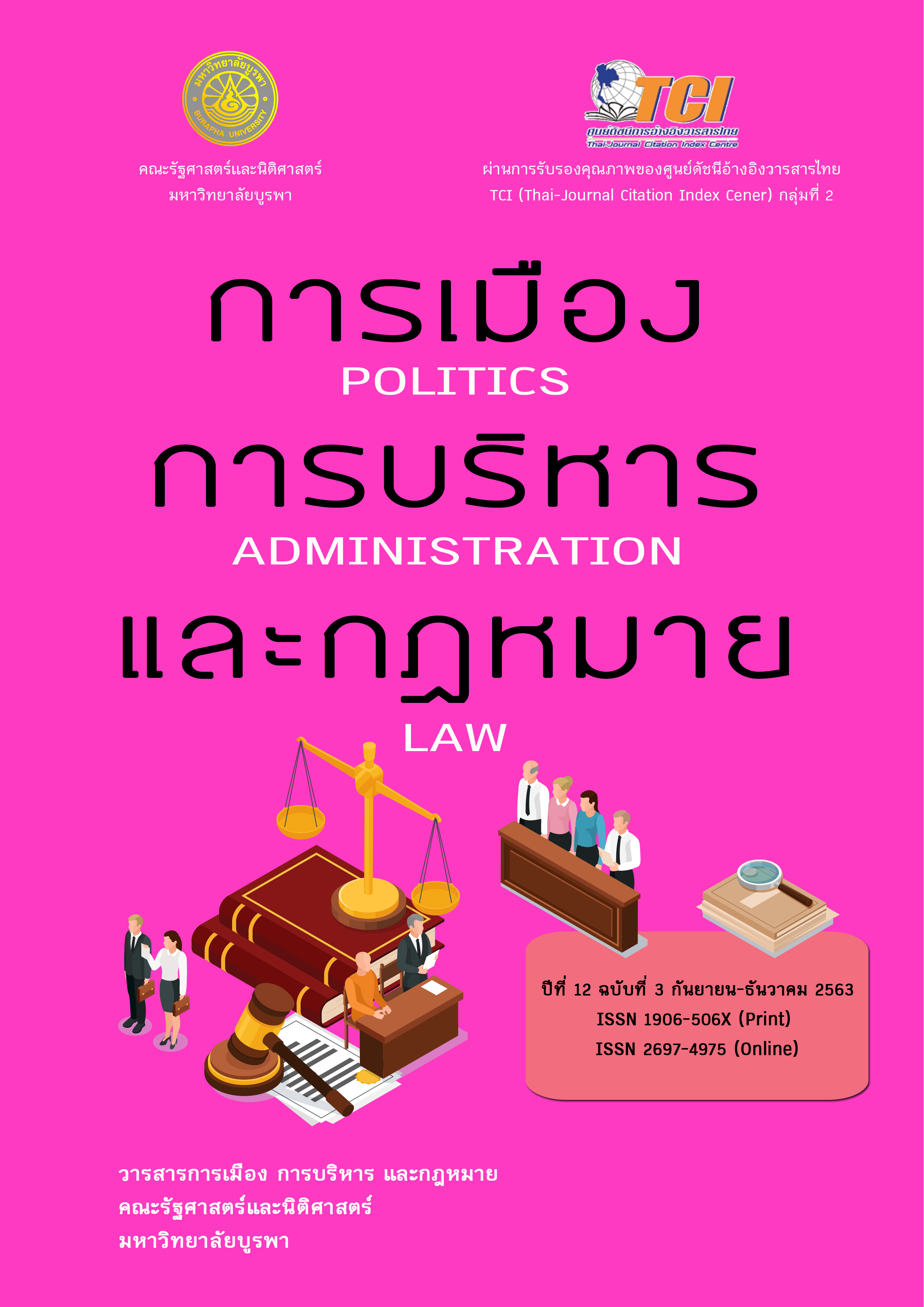พัฒนาการการไกล่เกลี่ยคดีอาญาในสังคมไทย สู่การแก้ไขปัญหาความรุนแรงในครอบครัวของพนักงานสอบสวน
คำสำคัญ:
การไกล่เกลี่ย, ความรุนแรงในครอบครัว, พนักงานสอบสวนบทคัดย่อ
ตำรวจหรือพนักงานสอบสวนนั้นนับเป็นหน้าด่านแรกในกระบวนการยุติธรรม มีอำนาจหน้าที่ในการรักษาความสงบเรียบร้อยของสังคม สอบสวนรวบรวมพยานหลักฐานทางคดี จับกุมผู้กระทำผิดมาลงโทษตามกฎหมาย อำนวยความยุติธรรมให้แก่ประชาชน และที่สำคัญคือ เป็นผู้ที่มีบทบาทสำคัญในการหันเหคดีหรือไกล่เกลี่ยคดีบางประเภท โดยเฉพาะคดีความผิดอันเกิดจากการใช้ความรุนแรงในครอบครัว เนื่องจากคดีการใช้ความรุนแรงในครอบครัวจะส่งผลกระทบต่อสัมพันธภาพระหว่างสมาชิกภายในครอบครัว และเมื่อสถาบันครอบครัวมีปัญหาก็จะส่งผลกระทบที่ขยายขอบเขตออกไปสู่สังคมโดยรวม ซึ่งปัญหาการใช้ความรุนแรงในครอบครัวนั้นเป็นปัญหาที่สืบเนื่องยาวนานในสังคมไทยและนับวันยิ่ง ทวีความรุนแรงมากขึ้น สำหรับบทความวิจัยฉบับนี้เป็นงานวิจัยเชิงคุณภาพที่มุ่งเน้นการศึกษาประวัติ ความเป็นมาของการปฏิบัติหน้าที่ไกล่เกลี่ยคดีอาญาในประเทศไทยตั้งแต่อดีตจนถึงปัจจุบัน สภาพปัญหาและรูปแบบการใช้ความรุนแรงในครอบครัวที่พนักงานสอบสวนเคยได้รับแจ้งความร้องทุกข์ ตลอดจนหน้าที่ของพนักงานสอบสวนในการดำเนินกระบวนการไกล่เกลี่ยคดีการใช้ความรุนแรงในครอบครัว รวมถึงปัญหาที่เกิดขึ้นจากการใช้กระบวนการไกล่เกลี่ยในคดีความรุนแรงในครอบครัวของพนักงานสอบสวนและวิธีการแก้ไขปัญหาดังกล่าว โดยใช้วิธีการวิเคราะห์ข้อมูลจากเอกสารประเภทงานบทความวิจัย เอกสารทางวิชาการ ประกอบกับการวิเคราะห์เนื้อหา (Content Analysis) จากข้อมูลที่ได้รับจากการสัมภาษณ์แบบเจาะลึกกับกลุ่มประชากร ได้แก่ กลุ่มพนักงานสอบสวนผู้เคยได้รับการแจ้งความร้องทุกข์ในคดีความรุนแรงในครอบครัว จำนวน 10 คน จากผลการศึกษาพบว่า 1) ประวัติความเป็นมาของการไกล่เกลี่ยในประเทศไทย แบ่งได้ 3 ยุค กล่าวคือ ยุคอดีต มักใช้ผู้ใหญ่ที่เคารพนับถือในชุมชนหรือหมู่บ้าน ผู้อาวุโส เป็นผู้ไกล่เกลี่ยคดีความต่าง ๆ ต่อมาในยุคกลางจารีตนครบาลเป็นผู้ทำหน้าที่ไกล่เกลี่ย และยุคปัจจุบันจึงเป็นเจ้าหน้าที่ตำรวจทำหน้าที่เป็นผู้ไกล่เกลี่ยคดี 2) รูปแบบการใช้ความรุนแรงในครอบครัวที่พนักงานสอบสวนเคยรับแจ้งความร้องทุกข์ ที่พบมากสุดคือ การใช้ความรุนแรงระหว่างคู่สามีภรรยา รองลงมาคือผู้ปกครองทำร้ายบุตรหลาน และสุดท้ายคือ บุตรหลานทำร้ายผู้สูงอายุ 3) พนักงานสอบสวนทำหน้าที่เป็นคนกลางในกระบวนการไกล่เกลี่ย ประสานงานคู่กรณี และติดตามผลการไกล่เกลี่ย ข้อเสนอแนะที่ได้จากการศึกษานี้คือ การสร้างองค์ความรู้ใหม่ที่สะท้อนให้เห็นถึงการแก้ไขและพัฒนารูปแบบและกระบวนการไกล่เกลี่ยคดีความรุนแรงในครอบครัวของพนักงานสอบสวน
เอกสารอ้างอิง
จุฑารัตน์ เอื้ออำนวย. (2545). กระบวนการยุติธรรมเชิงสมานฉันท์กับการเยียวยารอยร้าว. ใน เอกสารประกอบการเสวนาทางวิชาการ เรื่อง กระบวนการยุติธรรมเชิงสมานฉันท์กับคดีความรุนแรงใน ครอบครัว: ความเป็นไปได้ในการนำโครงการ “โรงซ่อมสามี” มาใช้ในสังคมไทย (หน้า 202).
ม.ป.ท.
จุฑารัตน์ เอื้ออำนวย. (2548). กระบวนการยุติธรรมเชิงสมานฉันท์: การคืน “อำนาจ” แก่เหยื่ออาชญากรรมและชุมชน. กรุงเทพฯ: สำนักงานกองทุนสนับสนุนการวิจัย [สกว.].
จุฑารัตน์ เอื้ออำนวย. (2556). ระบบยุติธรรมและยุติธรรมทางเลือก แนวการวิเคราะห์เชิงสังคมศาสตร์. กรุงเทพฯ: วี พริ้นท์ (1991) จำกัด.
พระราชบัญญัติคุ้มครองผู้ถูกกระทำด้วยความรุนแรงในครอบครัว พุทธศักราช 2550. (2550, 14 สิงหาคม). ราชกิจจานุเบกษา. เล่ม 124 ตอนที่ 41 ก. หน้า 1-2.
เรวัต ทองประกอบ. (2554). มาตรการทางกฎหมายเกี่ยวกับบทบาทของพนักงานสอบสวนต่อการไกล่เกลี่ยข้อพิพาทคดีอาญาในชั้นสอบสวน. วารสารการเมือง การบริหาร และกฎหมาย มหาวิทยาลัยบูรพา, 3(1), 89.
ลิขิต เพชรสว่าง. (2545). กระบวนการยุติธรรมเชิงสมานฉันท์ : ทางเลือกใหม่สำหรับกระบวนการยุติธรรมไทย. ใน เอกสารประกอบการสัมมนาทางวิชาการ. ม.ป.ท.
ศูนย์อัยการคุ้มครองสิทธิเด็ก เยาวชน และสถาบันครอบครัว สำนักงานคดีเยาวชนและครอบครัว และ กรมกิจการสตรีและสถาบันครอบครัว กระทรวงการพัฒนาสังคมและความมั่นคงของมนุษย์. (2560). แนวปฏิบัติในการคุ้มครองสวัสดิภาพผู้ถูกกระทำด้วยความรุนแรงในครอบครัวตาม พ.ร.บ.
คุ้มครองผู้ถูกกระทำด้วยความรุนแรงในครอบครัว พ.ศ. 2550. ใน เอกสารรายงานการจัดประชุมเชิงปฏิบัติการเพื่อพัฒนาองค์ความรู้เกี่ยวกับระบบการคุ้มครองสวัสดิภาพบุคคลในครอบครัว (ทีมสหวิชาชีพใน กทม.) (หน้า 13). ม.ป.ท.
สาธิดา คมขำ. (2554). เจตคติของบุคลากรในกระบวนการยุติธรรมต่อปัญหาสามีทำร้ายภรรยา. วารสารการเมือง การบริหาร และกฎหมาย มหาวิทยาลัยบูรพา, 3(1), 146.
Antoun, R. (1972). Arab Village. Bloomington: Indiana University Press.
Awad M. (1994). Conversation with the author regarding Palestinian dispute resolution processes.Cyprus: Summer Inc.
Moore, C. W. (1999). Practical Strategies for Resolving Conflict. California: Jossey-Bass Inc.
Ihromi, T. (1988). Informal Methods of Dispute Settlement in Indonesia. In C.Pe.G. Sosmena and A. Tadiar (ads.), Transcultural Mediation in the Asia-Pacific Organization for Mediators. n.d.
Krapp T. (1992). Presentation at the First European Conference on Peacemaking and Conflict Resolution. Altaya, Turkey.
Macduff, I. (1998). Mediation in New Zealand : Legislating for Community. n.d.
Pe, C., & Tadiar, A. (1998). A Katarungang Pambarangay : Dynamics of Compulsory Conciliation. Quezon City. Publishers’s Printing Press.
Shourie, H. (1998). Mediation Sans Legislation : An Experiment in India. New Delhi.
Shourie, H. (1988). Mediation Sans Legislation : An Experiment in India, India”, In Pe, C., Sosmena, G., and Tadiar, A. (ads.), Transcultural Mediation in the AsiaPacific. Manlia, Philippines: Asia- Pacific Organization for Mediators. n.d.
Wildau, M. and Mayer. (1993). Developing Democratic Decission - Making and Dispute Resolution Procedures Abroad. Conflict Resolution Quarterly, 10(3), 240-254.






